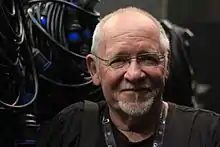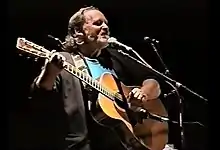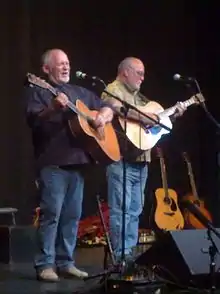Eric Bogle
Eric Bogle (born 23 September 1944) is a Scottish folk singer-songwriter. Born and raised in Scotland, he emigrated to Australia at the age of 25, to settle near Adelaide, South Australia. Bogle's songs have covered a variety of topics, and have been performed by many artists. Two of his best known songs are "No Man's Land" (or "The Green Fields of France") and "And the Band Played Waltzing Matilda", with the latter named one of the APRA Top 30 Australian songs in 2001, as part of the celebrations for the Australasian Performing Right Association's 75th anniversary.
Eric Bogle | |
|---|---|
 Bogle during the Festival Interceltique de Lorient in 2016 | |
| Background information | |
| Born | 23 September 1944 Peebles, Scotland |
| Genres | Folk |
| Occupation(s) | Singer-songwriter |
| Associated acts | John Campbell Munro |
Early years
Eric Bogle was born on 23 September 1944 in Peebles, Scotland. His father was a railway Signalman who could play the bagpipes.[1][2] Bogle started writing poetry when he was eight years old.[2] After attending school until he was sixteen, Bogle worked in various trades: labourer, clerk and barman.[2] In 1969, Bogle emigrated to Australia and initially lived in the capital, Canberra, where he worked as an accountant.[1] He had an interest in politics and by 1980 had moved to Queensland before settling in Adelaide.[1]
Career

Bogle taught himself to play guitar and joined a skiffle and rock band.[2] He was the leader of Eric and the Informers in Scotland.[1] His early influences were Lonnie Donegan, Elvis Presley and Ewan MacColl.[2] He turned to folk music prior to emigrating to Australia – his first written songs concerned his parents. One of these, "Leaving Nancy", which sang of the day he left home for Australia, being the last time he saw his mother Nancy, was often covered, most notably by The Dubliners and The Fureys.[1] When living in Canberra he joined the local folk music scene and performed occasionally.[2]
Several of his most famous songs tell of the futility or loss of war. Prominent among these is "And The Band Played Waltzing Matilda", written in 1971. The lyrics recount the experiences of a member of the Australian and New Zealand Army Corps (ANZAC) in the Battle of Gallipoli. It has also been interpreted as a reaction to the Vietnam War.
Another of his best-known songs, "No Man's Land", is also World War I-themed. This song is commonly known as "The Green Fields of France", a title it was first given by The Fureys, and which has subsequently been used in many further cover versions. The song refers to the traditional Scottish song "Flowers of the Forest" being played over the grave of a World War I soldier. Bogle deliberately gave the dead soldier an Irish name ("Willie McBride") as a counter to the anti-Irish sentiment prevalent in Britain during the 1970s. This song has been covered by Alex Beaton (with "A Scottish Soldier" from The Water is Wide), Plethyn ("Gwaed ar eu Dwylo" (Blood on their Hands), sung in Welsh from "Blas y Pridd"), and Hannes Wader ("Es ist an der Zeit" (It is the Time)). American folk singer Charlie Zahm also has a version on his album Festival Favorites, as does American Folk Singer Robert Marr on his 2011 album Celticism. The lyrics from the song were referred to former British Prime Minister Tony Blair in 2003 as his favorite anti-war poem.[3]
"As if he Knows" (2001) widens the theme of the wastage of war to describe the sadness of Australian mounted soldiers in Palestine in 1918 as they are obliged to shoot their horses, "who asked so little and gave so much", before embarkation.
Another notable song on a similar theme, but with a more contemporary setting, is the Troubles-inspired "My Youngest Son Came Home Today", with its tale of a young man killed during fighting in Northern Ireland. Notably, the song does not take sides in the conflict; it does not mention whether the title character is a nationalist or loyalist. However, the song has been adopted by Nationalists and is now associated with Irish Republicanism. When Billy Bragg covered the song, he changed the line "dreams of freedom unfulfilled" (which echoes the language of Nationalists) to "dreams of glory unfulfilled". Memorable gigs can be recalled by fellow artists such as Fran Malone who played with Eric in An Rinn in the 1990s.
Bogle's songs cover a wide range of subjects and themes, including comedic songs ("The Aussie Bar-B-Q"), satires ("I Hate Wogs"), protest songs and serious songs about the human condition such as "Now I'm Easy". His song "Safe in the Harbour" is an homage to Stan Rogers. "Katie and the Dreamtime Land" is a tribute to American folk singer Kate Wolf, who died from leukemia in 1986. Other well-known songs, with lighter subject matter, include two homages to departed pets, "Little Gomez" and "Nobody's Moggy Now" and an acknowledgment of his folk music fans with "Do You Sing Any Dylan?".
In 2000 a five-CD collection, Singing The Spirit Home, was released. His first and only live performance DVD was released in May 2009.
Touring

Bogle has undertaken an extensive concert tour of the UK (sometimes including appearances in continental Europe as well), every three years since 1985. These tours have usually included a supporting cast of Australian-based singers and musicians, most regularly John Munro and Brent Miller. Bogle said that his 2009 tour, with John Munro, would be his last overseas tour. This featured a Saturday Night Special on 27 June with Martyn Wyndham-Read, Johnny Collins and Les Sullivan in Watford, the closest venue to London.
More recent tours in Australia have included Adelaide-based musicians Emma Luker (fiddle) and Pete Titchener (guitar/bass)
Bogle was a prominent artist at the National Folk Festival in Canberra over Easter 2011, has been a regular artist at the Port Fairy Folk Festival held in Port Fairy, Victoria, Australia every March.[4]
Tributes
On 25 January 1987, Eric Bogle was appointed a Member of the Order of Australia, "In recognition of service to the performing arts as a song writer and singer".[5]
Many of Bogle's songs have been covered by other artists; including John Schumann, The Skids, June Tabor, The Men They Couldn't Hang, The Clancy Brothers, The Dubliners, John McDermott, Liam Clancy, Mike Harding, The Pogues, De Dannan, Dropkick Murphys, The Corries, Billy Bragg, The Bushwackers, Slim Dusty, Mary Black and John Williamson. In May 2001 the Australasian Performing Right Association (APRA), as part of its 75th Anniversary celebrations, named his song, "And the Band Played Waltzing Matilda", as one of the Top 30 Australian songs of all time.[6]
Discography
Studio albums
- Now I'm Easy (1980)
- Plain & Simple (1981) with John Munro featuring 'Queensland Whaler' (1960) by Harry Robertson [7] [8]
- Scraps of Paper (1982) [AUS #84[9]]
- When The Wind Blows (1984) with John Munro and Brent Miller [AUS #78[9]]
- Hard Hard Times (1985) with John Munro
- Singing The Spirit Home (1986) [AUS #96[9]]
- Something of Value (1988)
- Voices in the Wilderness (1990)
- Mirrors (1993)
- The Emigrant & The Exile (1996) with John Munro
- Small Miracles (1997)
- Endangered Species (1999)
- The Colour of Dreams (2002)
- Other People's Children (2005)
- The Dreamer (2009)
- A Toss of the Coin (2013) with John Munro
- Voices (2016) with John Munro
Live albums
- In Person (1977) Recorded live in Germany, February 1977
- Vol. 1 – Live in Person (1982) Reissue of 1977 In Person release
- Vol. 2 – Down Under (1982) Recorded February & May 1977 – unauthorized release[10][11]
- Vol. 3 – Pure (1982) Recorded February & May 1977 – unauthorized release[10][11]
- In Concert (1985) with John Munro & Brent Miller - Recorded at the Octagon Theatre, University of W.A. in August 1984.
- I Wrote This Wee Song... (1994) Recorded live at the Adelaide Arts Theatre on 31 July 1993
- At This Stage: The Live Collection (2005) Includes 1985 In Concert release and material from 3 other performances
- Live at Stoneyfell Winery (2009) DVD - Recorded live at Stoneyfell Winery, Adelaide, South Australia on 1 March 2009
Anthologies
- The Eric Bogle Songbook (1986)
- Not The Worst of Eric Bogle (1990)
- It's Not Cricket (1992)
- The Eric Bogle Songbook Volume 2 (1992)
- Just The Funny Stuff (1994)
- The Gift of Years: Very Best Of (2000)
- By Request (2001)
- Singing The Spirit Home (2005) Limited Edition 5 CD collection
- A Few Old Songs For Very New Times (2010)
References
- Halday, Bronwyn; Meikle, Ian; Bogle, Eric; Schumann, John; Wordley, Mick; Munro, John C (22 December 2009). "Songlines: Eric Bogle and John Schumann in Concert and Conversation". Music Australia. National Library of Australia. Retrieved 12 December 2011.
- "Eric Bogle (1944–)". Music Australia. National Library of Australia. 10 August 2004. Retrieved 12 December 2011.
- "And the band plays on . . ". The Age. 24 February 2003.
- "Program" (PDF). Folkfestival.asn.au. Archived from the original (PDF) on 26 July 2011. Retrieved 11 November 2017.
- "Bogle, Eric". It's an Honour – Honours – Search Australian Honours. Government of Australia. 26 January 1987. Retrieved 12 December 2011.
- Kruger, Debbie (2 May 2001). "The songs that resonate through the years" (PDF). Australasian Performing Right Association (APRA). Archived from the original (PDF) on 30 October 2008. Retrieved 11 December 2001.
- "The rose, shamrock and thistle". Tribune (1589). New South Wales, Australia. 18 December 1968. p. 6. Retrieved 31 January 2021 – via National Library of Australia.
- url=http://www.harryrobertson.net/QueenslandWhalers.html
- Kent, David (1993). Australian Chart Book 1970–1992 (illustrated ed.). St Ives, N.S.W.: Australian Chart Book. p. 39. ISBN 0-646-11917-6.
- "Eric Bogle – Volume 1 – In Person: Folk Music, etc. from Australia at theBalladeers". Theballadeers.com. Retrieved 11 November 2017.
- "Welcome to the official Eric Bogle Website". Ericbogle.net. Retrieved 11 November 2017.
Bibliography
- Walsh, Michael J. K. (2018). Eric Bogle, music and the Great War : 'An old man's tears'. Abingdon; New-York: Routledge. p. 179. ISBN 9781138719118.
External links
- Eric Bogle discography at Discogs
- Eric Bogle discography at MusicBrainz
- Interview with Eric Bogle (2007) at the Wayback Machine (archived 2 April 2007)
